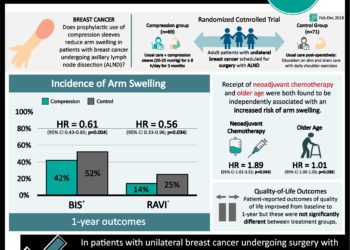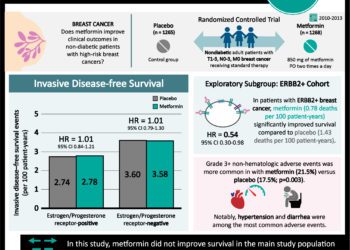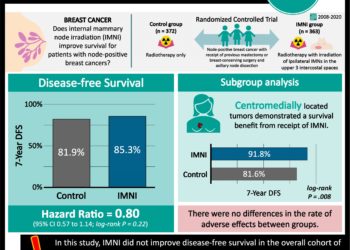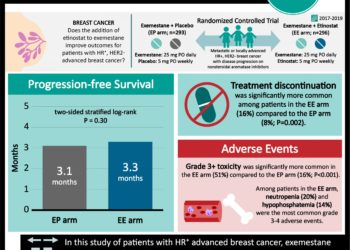Compression sleeves used prophylactically decrease arm swelling after breast cancer surgery
1. Compression sleeves reduced and delayed the incidence of lymphedema in the first year after surgery
2. Quality of life measures were not significantly different between the compression sleeve group and the control group
Evidence Rating Level: 2 (Good)
Study Rundown: Lymphedema in the arm(s) after axillary lymph node dissection (ALND) as part of breast cancer treatment is common. This study aimed to determine whether compression sleeve usage prophylactically would decrease the incidence of swelling during the year following breast cancer treatment as compared with standard post-treatment care. The impact on quality of life was also explored. The incidence of arm swelling was greater in the control group (80 of 149) as compared to the compression group (58 of 152). No significant differences were detected between either group with respect to quality-of-life measures. Limitations to this study include its small sample size as well as its inability to project whether the reduced incidence and delayed onset of lymphedema will result in decreased breast cancer related lymphedema in the future. This study plans to follow the participants prospectively in order to address this limitation of applicability. Overall, the prophylactic use of compression sleeves after axillary lymph node dissection for breast cancer treatment appears to reduce the incidence and delays the onset of upper extremity lymphedema.
Click to read the study in the Journal of Clinical Oncology
Relevant Reading: A brief summary of the consensus discussion on customizing therapies for women with early breast cancer
In-Depth [randomized controlled trial]: This single-blind, stratified randomized controlled trial study conducted in Mubai, India included 307 adult women randomly allocated to either the control group (n=152) or the compression group (n=154); 149 control group participants and 152 compression group participants were included in the analysis. Primary study outcomes were the incidence of arm swelling and secondary outcomes included impact on quality of life. The incidence of arm swelling was less in the compression group (58 of 152) than in the control group (80 of 149) (HR = 0.61; 95% confidence interval (CI), 0.43 to 0.85). At 1 year, the estimated cumulative incidence of lymphedema was 52% in the control group (95% CI, 44% to 61%) compared to 42% in the compression group (95% CI, 34% to 51%). Quality of life measures were not significantly different between the two groups.
Image: PD
©2022 2 Minute Medicine, Inc. All rights reserved. No works may be reproduced without expressed written consent from 2 Minute Medicine, Inc. Inquire about licensing here. No article should be construed as medical advice and is not intended as such by the authors or by 2 Minute Medicine, Inc.







